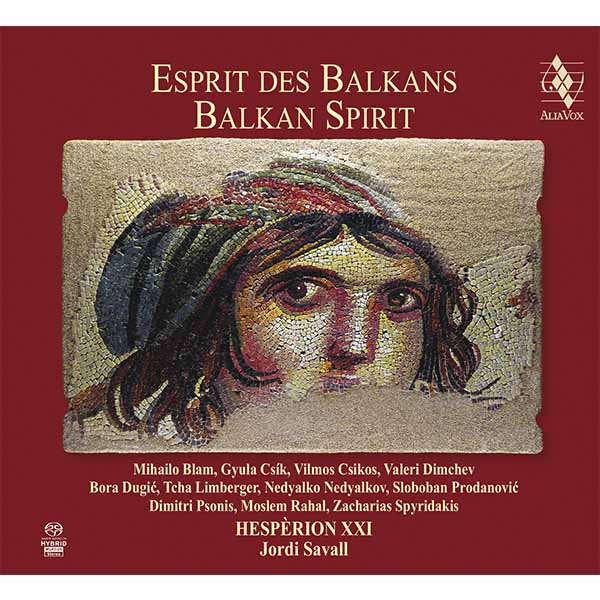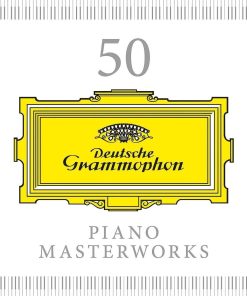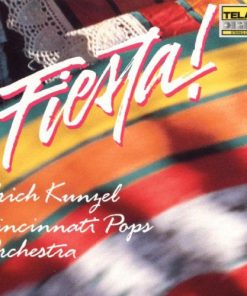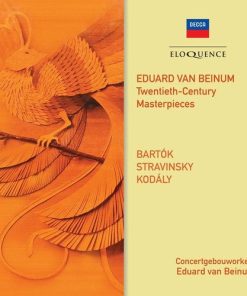ESPRIT DES BALKANS (BALKAN SPIRIT): HESPERION XXI, SAVALL (HYBRID SACD) ALIA VOX
$ 22,99 $ 13,79

HESPÈRION XXI
Jordi Savall
Despite their turbulent history and their linguistic and political fragmentation, the peoples of the Balkans still share a great many cultural traits and the legacy of their historical past. And it is their shared features that we wish to highlight in this first recording along with our guest musicians from the various cultures, religions and regions. With them we have studied, selected, prepared and recorded a variety of pieces to create a beautiful musical anthology, combining the ancient, the traditional and the popular from this fascinating and still very mysterious part of Eastern Europe. We firmly believe that the emotion, vitality and beauty of all these musical expressions will help us to understand more fully what can be seen as the musical image of the authentic “Spirit of the Balkans.”

1. Borin Cocek (Serbie)
2. Doina, hora (Roumanie)
3. Ta xyla & Çeçen kızı (Grèce & Turquie)
4. Chichovata (Nord-ouest Bulgarie)
5. Der makām-ı Hüseynī Sakīl-i Ağa Rıżā (Turquie)
6. Zajdi, Zajdi (Serbie). Aleksandar Sarijevski
7. Sborenka (Dobrudzha, Nord-est Bulgarie)
8. Azt hittem hogy minden könnyem (Tsigane)
9. Kovni (Tradition Kurde)
10. Cuando el Rey Nimrod (Séfarade)
11. Sousta (Grèce)
12. Galabovska Ruchenitsa (Thrace, Sud-est Bulgarie)
13. Bilijana (Pirin, Sud-ouest Macédoine)
14. Ciocârlia / Seva. Bora Dugić d’après Angheluş Dinicu, Paris 1889
15. Suite – Doina, Purtata, Hora ka la kaval (Roumanie-Tsigane)
16. Sanie cu zurgălăi (Tsigane). Richard Stein
17. Suite – Hora de ascultare, Hora mare, Hora lui Dragoi (Roumanie-Tsigane)
18. Vrcavo Kolo (Tradition de Serbie centrale)
19. Pastirska Elegija (Serbie). Version musicale Bora Dugić et Jordi Savall
Fast Shipping and Professional Packing
Due to our longstanding partnership with UPS FedEx DHL and other leading international carriers, we are able to provide a range of shipping options. Our warehouse staff are highly trained to pack your goods exactly according to the specifications that we supply. Your goods will undergo a thorough examination and will be safely packaged prior to being sent out. Everyday we deliver hundreds of packages to our customers from all over the world. This is an indication of our dedication to being the largest online retailer worldwide. Warehouses and distribution centers can be located in Europe as well as the USA.
Orders with more than 1 item are assigned processing periods for each item.
Before shipment, all ordered products will be thoroughly inspected. Today, most orders will be shipped within 48 hours. The estimated delivery time is between 3-7 days.
Returns
The stock is constantly changing. It's not entirely managed by us since we are involved with multiple parties such as the factory and our storage. The actual stock can fluctuate at any time. Please understand it may happen that your order will be out of stock when the order is placed.
Our policy is valid for 30 days. If you haven't received your product within 30 days, we're not able to issue either a return or exchange.
You are able to return a product if it is unused and in the same condition when you received it. It must also still remain in the original packaging.























































